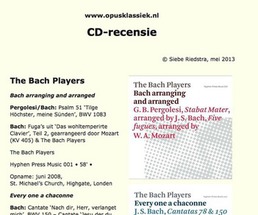Back to Reviews
Review of our first four CDs

We have just caught up with this review of our first four CDs on the Dutch Opus Klassiek website, by Siebe Riedstra. He really gets what we have been aiming for with our recordings. We give an English translation below.
One of the most fascinating results of the crumbling of the ‘music industry’ is the weeds that pop up everywhere between the paving stones. The musical passion of the performers is twinned with the musical appetite of the listeners, and the result is an unparalleled richness in new releases. Classical music lovers have the time of their life, despite the demise of this much praised industry. Certainly a lot has changed: the big earners of yesterday drop out and the small businesses jump into the gap, remaining poor but happy.
One such small undertaking is the British publisher Hyphen Press, which decided to add CDs to its catalogue, alongside books. Together with The Bach Players – also British – they offer releases that show interesting thematic connections and that are designed in recognizable flat and environmentally friendly cardboard packets. That I review four of their CDs here together is due to the fact that they have apparently only recently signed up with a distributor in our market. Another reason is the considered choice of repertoire, which moves along thematic paths. Through these paths interesting interconnections are made, which lead to interesting discoveries. Ever heard of Philipp Heinrich Erlebach?
The choice of repertoire is inspired by appealing common denominators: parody, chaconne, the French versus the Italian baroque, and everything that derives from this, with Johann Sebastian Bach at the centre of the vision. Performance practice joins the present trend towards using small forces. The great thing of this series lies in these themes, worked out in concerts and then recorded.
The first CD has the title Bach arranging and arranged. Bach took Pergolesi’s Stabat Mater, added a viola part and made it sound new in a Protestant guise: Psalm 51, ‘Tilge Höchster, meine Sünden’. The Dutch Baron van Swieten introduced Mozart to both Bach and Handel’s music. It became a logical step for Mozart to arrange Bach and Handel. Messiah in Mozart’s version (with clarinets) is perhaps not everyone’s cup of tea, but Wolfgang’s arrangement for strings of parts of the Wohltemperierte Klavier are instrumental jewels – if only for the immediate reference to the wonderful ‘Adagio and Fugue’ K546.
The second release is titled Everyone a chaconne, an obvious wink to Brahms’s fourth symphony. Brahms based the last movement of this symphony on the theme of the chaconne from the last chorus of Cantata 150 by Johann Sebastian Bach – with a small variation: Brahms adds a semi-tone to the rising fifth on the fourth inversion. Philipp Heinrich Erlebach (1657–1714), who worked at the court at Rudolstadt in Thüringen, wrote six overtures – dance suites – for strings. The fifth one ends with a chaconne.
CD number 3 is about the French Overture, a genre that was immensely popular in Germany, judging by the Ouvertüren – orchestral suites – of Johann Sebastian. The fact that Bach also used this form in his cantatas will be news for many people, and it is demonstrated beautifully here in the opening movements of Cantatas 61 and 97. The inclusion of three versions of the famous song ‘Innsbruck, ich muß dich lassen’ by Heinrich Isaac might seem far-fetched, until we discover that the melody is the cantus firmus in Cantata 97. Another Ouverture by Erlebach is brought out of obscurity: the fourth one opens with a real French overture.
The fourth CD is concerned with the historical opposition of France and Italy: Corelli versus Lully. Given the immense popularity of Arcangelo Corelli in Britain it is as much an expression of the age-old power struggle between France and Albion. That there are many different shades in this supposed opposition becomes clear in Couperin’s Apothéose de Corelli, where the leader Nicolette Moonen speaks en passant the descriptive titles. The cosmopolitan Georg Muffat, of Scottish descent, raised in the Alsace and German through and through, shows how he strives for a symbiosis between these styles.
The Bach Players were founded in 1996 – in London – by Nicolette Moonen, who was raised in Amsterdam. She grew up bilingual, and one of these languages was clearly French, judging by her excellent diction in the Apothéose de Corelli. In 2008 the collaboration with Hyphen Press started, and in the meantime six CDs by the ensemble have been released. A comparison with the Nederlandse Bachvereniging is obvious – given the use of small forces and the interest in adventurous repertoire. Committed musicians with a mission, excellent recording quality, and notably tasteful in presentation.
Siebe Riedstra, Opus Klassiek, May 2013